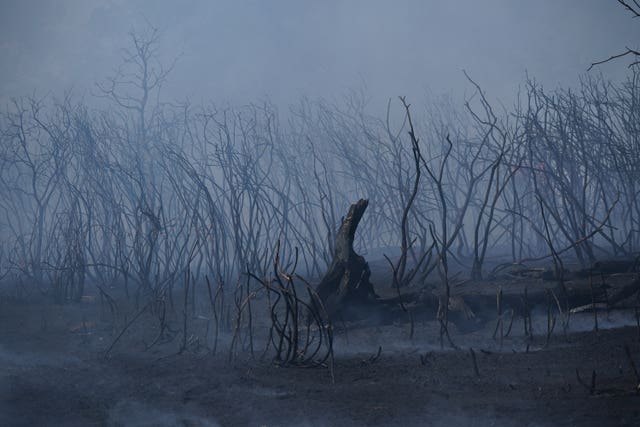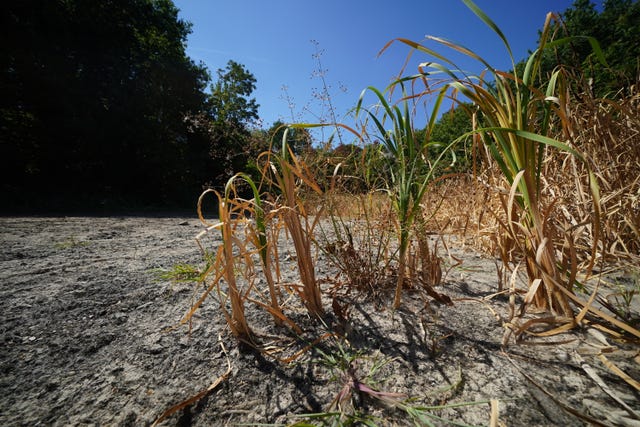
The Government has presided over a “lost decade” and failed to adequately plan and adapt to climate change, its advisers have said.
A new report from the Climate Change Committee (CCC), which advises the Government on its climate policy, concluded that its lack of planning and failure to implement adaptation policies where they exist risks exposing the UK to a host of climate-related threats.
The CCC examined the preparedness of various sectors such as food security, water supply, transport, health, business, agriculture and finance and found adaptation efforts to be “lacking across the board”.
Of the 45 adaptation outcomes the Government wants to achieve, the CCC said only five have fully credible plans, while there is no evidence of effective measures being implemented in any of them.

Baroness Brown, chairwoman of the CCC’s adaptation committee, said: “The last decade has been a lost decade in terms of preparing for and adapting to the risks – the risks we already have and those that we know are coming.
“Whilst we’ve seen some progress in planning for climate change, in fact there is still very little evidence of impact on the ground.”
Last summer was an example and a warning, she said, citing the record-breaking 40C temperatures, 1,000 heat-related deaths, 20% of hospital operations cancelled, rail disruption, widespread drought and a spate of wildfires that destroyed dozens of homes.
She added: “The Government’s lack of urgency on climate resilience is in sharp contrast to the recent experience of people in this country.
“People, nature and infrastructure face damaging impacts as climate change takes hold. These impacts will only intensify in the coming decades.”
Even if the global goal of reaching net zero is achieved, the climate will continue to warm for another 30 years, said Chris Stark, the CCC’s chief executive, so the UK must prepare for hotter and more unstable conditions.
The Government’s National Adaptation Programme (NAP), however, which sets out its plan to prepare for climate change, “fails to match the challenge facing the country”, the CCC said.
It lacks vision, is not underpinned by tangible outcomes or targets and has not driven policy or implementation across Government, they added.
The third NAP, due for publication this summer, is a “make-or-break moment to avoid a further five years of lacklustre planning and preparation”.
Gareth Redmond-King, international lead at the Energy and Climate Intelligence Unit, said: “Food supply is just one of the ways our national security is imperilled by an increasingly unstable world.
“Last year, gas prices and climate impacts added hundreds of pounds to British consumers’ food bills.
“This year, yields of some vegetable crops have fallen off the back of extreme heat and subsequent drought.”

Professor Chris Hilson, director of the Centre for Climate and Justice at the University of Reading, said: “Climate adaptation policy must be joined up with policy on mitigation.
“With homes overheating in summer heatwaves, for example, there is little point spending money on this without at the same time tackling poor insulation and energy efficiency to cope with cold winter temperatures.”
Green Party MP Caroline Lucas added: “In the past year we’ve seen flooding, drought, chronic food shortages and the hottest temperatures on record – the climate emergency has well and truly arrived.
“Not only are we ill-equipped for what’s happening now, but we’re also nowhere near ready for what could happen in the future. Adapting to the climate emergency is not a matter of choice, but necessity.
“Mitigating its very worst impacts – while delivering green and resilient homes, healthy and low-carbon food and a restored natural world – requires not just more planning, but also more political will to act with real urgency.”


Why are you making commenting on The National only available to subscribers?
We know there are thousands of National readers who want to debate, argue and go back and forth in the comments section of our stories. We’ve got the most informed readers in Scotland, asking each other the big questions about the future of our country.
Unfortunately, though, these important debates are being spoiled by a vocal minority of trolls who aren’t really interested in the issues, try to derail the conversations, register under fake names, and post vile abuse.
So that’s why we’ve decided to make the ability to comment only available to our paying subscribers. That way, all the trolls who post abuse on our website will have to pay if they want to join the debate – and risk a permanent ban from the account that they subscribe with.
The conversation will go back to what it should be about – people who care passionately about the issues, but disagree constructively on what we should do about them. Let’s get that debate started!
Callum Baird, Editor of The National
Comments: Our rules
We want our comments to be a lively and valuable part of our community - a place where readers can debate and engage with the most important local issues. The ability to comment on our stories is a privilege, not a right, however, and that privilege may be withdrawn if it is abused or misused.
Please report any comments that break our rules.
Read the rules here